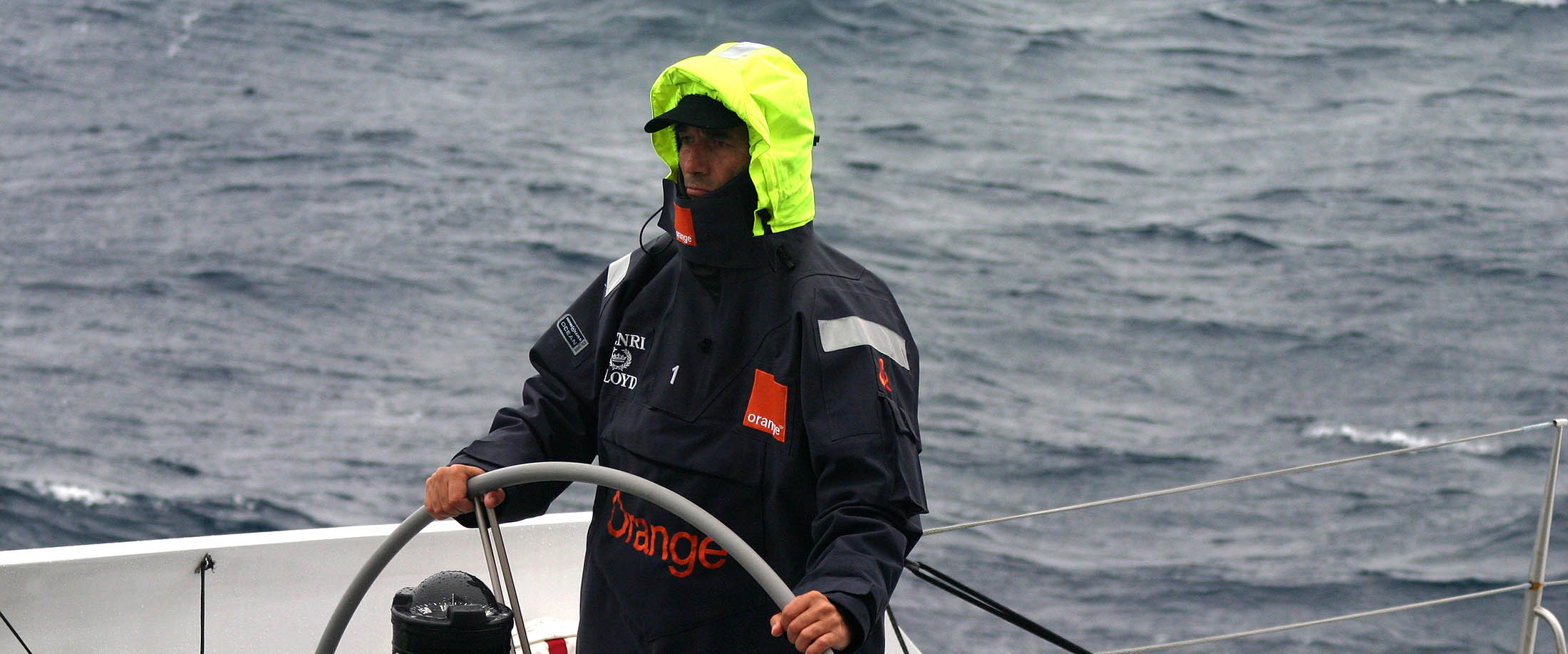Bruno Peyron(1)(1)
Photo Jacques Vapillon is the eldest in a brood of sailing brothers: three adventurers from the one line of sailors who came to sailing at a tender age on France’s Loire-Atlantique coast. The skipper with big dreams turned into a record hunter, one of the most obstinate maritime talents of his generation.
Bruno Peyron originally aimed to enroll in France’s École Nationale Supérieure Maritime (ENSM), following the trail of his father, captain in the merchant marine. But in the way that his father turned away from the French Navy for the research fleet, Bruno Peyron soon left cargo ships behind for ocean racing.
Notably inspired by the path followed by his uncle on his mother’s side, Jean-Yves Terlain, he accomplished his first transatlantic at the age of 22 years, on a 6.50-meter boat.
He took part four times in the Solitaire du Figaro and three times in the Route du Rhum.
Twice ranked second in the Route du Rhum, in 1982 and 1986, he then came out second in the La Baule-Dakar in 1987, before winning the Transat in a duo in 1989.
Big dreams
In 1990, the Route du Rhum limited the size of competing boats to 60 feet and refused to admit Bruno Peyron’s yacht, considered to fall outside the regulations, like those of two other competitors. The skipper then sailed across the Atlantic outside competition.
This setback inspired him with a dream: a catamaran for the year 2000, a monster aimed at beating all records on a course open to all boats with no size restrictions.
The Jules Verne Trophy enabled him to test this project against reality. In 1993, Bruno Peyron, on board Commodore Explorer, one of the largest catamarans of his generation, smashed the round-the-world speed record in 79 days and 6 hours – a world first.
The Race
But this inaugural winner of the Jules Verne did not content himself with a race against time. He developed The Race, a round-the-world race without stops or assistance open to yachts with no size restrictions.
Six boats took part in the first edition of The Race, departing on 31 December 2000 from Barcelona. The competition was won by skipper Grant Dalton on the catamaran Club Med, in 62 days, 6 hours, 56 minutes and 33 seconds.
The next edition, scheduled for 2004, was cancelled due to the economic difficulties of competitors.
In the meantime, Bruno Peyron once again carried off the Jules Verne Trophy in 2002 and set off on another attempt in 2005. Yet another victory.
The Cup
In 2011, Bruno Peyron announced the launch, along with his brother Loïck, of the Energy Team challenge: a French team to vie for the 34th America’s Cup, to be fought out in September 2013 in San Francisco. The project grew in size, but due to budgetary hiccups, Energy Team was unable to participate in the Cup.
Records
Bruno Peyron’s records reflect the bombast and knowhow of this record-hunter: eight times the world’s number one in ocean records (1993, 1998, 2000, 2001, 2002, 2003, 2005, 2006), he has also beaten the Atlantic record three times (1987, 1992, 2006), the Pacific record five times (1997, 1998, 1993, 2002, 2005), the 24-hour record five times (1982, 1997, 2000, 2004, 2006), and he holds 39 ocean records.
Finally, his hunting scoreboard also includes the absolute record for the highest number of miles covered in ocean maxi-catamarans.
This career at the top has earned him two Neptune d’Or awards and three nominations as “World Yachtsman of the Year”.
Awards (extract)
1987 – second in the La Baule-Dakar race
1989 – winner of the Transat (Lorient-Saint-Barthélemy-Lorient) duo with Jacques Vincent.
1993 – first winner of the Jules Verne Trophy
2002 – three-time winner of the Jules Verne Trophy
2005 – winner of the Jules Verne Trophy




